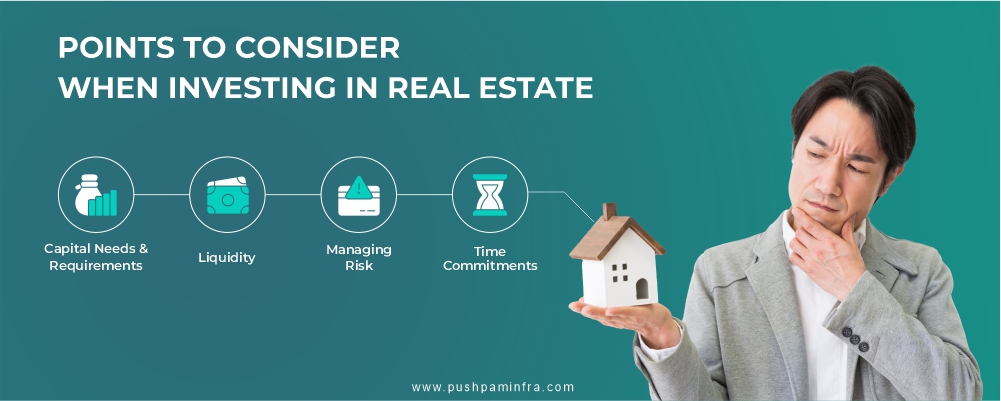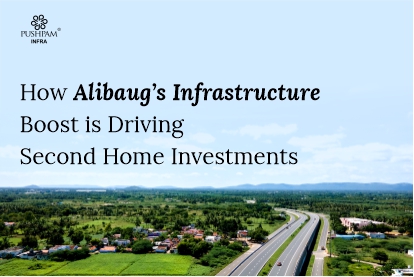How to Diversify Your Investment Portfolio with Real Estate
One of the major investment principles is diversification. This helps diversify risk and improves returns. Including real estate in investment portfolios is an efficient diversification measure. This is because a real estate portfolio may spread over different asset types.
A diversified real estate portfolio provides stable, predictable incomes, tax benefits, and strong appreciation. It will hence be a good investment for all types of investors. Let us explore the art of diversifying a real estate portfolio. Also, let us guide you through some of the key strategies and benefits involved in investment in real estate.

Key Investment Strategies
Are you looking for furnished resort homes and other premium real estate projects around Mumbai? Areas like Karjat, Dapoli, and Alibaug are the top choices for a quality living experience. Reputed hospitality brands manage the resort homes in these areas. They believe in offering the best services and maintaining a robust customer base.
The answer to ‘how to build a real estate portfolio’ depends a lot on your needs and preferences. To get maximum returns, you must strike the perfect balance in your investment basket.
Here are some real estate investment strategies that can provide you with insights on how to build a real estate portfolio:
- Opt for rental properties
- Invest in Real Estate Investment Trusts (REITs)
- Consider investing in Real Estate Notes
- Make land investments
- Opt for properties having zero maintenance charges and a lease-back guarantee.
According to CBRE India, property prices in mainstream cities like Mumbai, Pune, Delhi NCR, and Bangalore have increased by 6 to 8% annually in the last five years.
Benefits of Investing in Real Estate
Let’s delve into the many benefits that make real estate an attractive investment choice:
• Stable Income Stream:
Real estate investing offers investors a stable cash flow via rental income. This can be a decent source of generating passive income for a large group of investors.
• Long-Term Potential:
Building a strong real estate portfolio comes with substantial monetary appreciation. This is because property rates tend to go up over a certain period of time. This can be because of infrastructure development, population growth, and economic improvements in the area.
• Hedge Against Inflation:
Real estate investing can be an excellent hedge against uncontrollable economic factors. Real estate performs well during times of uncertainty. It can safeguard your purchasing power during adversities and inflationary periods.
• Tangible Asset:
Unlike shares and bonds, real estate investing is like owning a physical asset with an increasing intrinsic value. During times of volatility or recessions, real estate can provide the required stability.
• Tax Benefits:
A diversified real estate portfolio also offers many tax advantages. This includes deductions for mortgage interest and taxes relating to asset depreciation. Hence, these aspects can assist investors in enhancing returns. According to Knight Frank, real estate makes up for around 8 to 10% of the average asset allocation in the portfolio of Indian HNIs. This is lower than the global average, wherein real estate holds 30% of the portfolio of rich investors.
Points to Consider When Investing in Real Estate
Here are a few points to consider before diving into your investment journey:

• Capital Needs and Requirements:
Direct investments in building a diversified real estate portfolio need a huge capital investment during the initial phase. This can also include closing charges, down payments, and other ongoing maintenance costs. But, the initial investment can be lowered to some extent. This can be done by considering options like Real Estate Investment Trusts, real estate ETFs, and crowdfunding.
• Liquidity:
Unlike other asset classes, creating a diversified real estate portfolio may seem illiquid. If you wish to sell an asset immediately, it might take time to get a buyer, particularly in less attractive regions. Real estate ETFs and Real Estate Investment Trusts can provide greater liquidity. This is because they can be purchased and sold through public exchanges.
• Managing Risk:
Building a diversified real estate portfolio can involve various risks and uncertainties. This can include market variations, defaults in making payments, and natural calamities. Diversification across property types, investment modes, and locations can help reduce risks. It's also important to remain mindful of economic factors and interest rate changes.
• Time Commitments:
Direct investments in real estate or renting can require active management. This can include property maintenance and handling legal matters. But, if you prefer a hands-off approach, mutual funds, crowdfunding, and Real Estate Investment Trusts can be brilliant. According to ICRA (India Ratings and Research), Indian REITs provided annual returns of around 9 to 12% in 2023. They outperformed traditional asset classes such as savings accounts and bonds. Also, in cities like Mumbai, Bangalore, and Delhi, the demand for co-working spaces is increasing. They are a top choice for businesses offering gated communities with modern amenities. This flexible working spot is anticipated to grow by 25% annually in the next five years.
Final Thoughts
Adding real estate investments to your basket can be helpful for diversification and can increase your returns. Whether through direct property acquisition, crowdfunding, or REITs, real estate is a great investment tool. It offers several distinct advantages for everyone. Some main advantages include income generation, safeguarding against inflation, and long-term appreciation. But, before investing in real estate, investors must assess their financial goals, risk appetite, and time commitments. Hence, it is advisable to choose the correct mix of real estate investments. A well-diversified portfolio can help you fulfil your financial dreams.
FAQs
Indian cities like Mumbai, Bangalore, Delhi NCR, Hyderabad, Pune, Kolkata, Chennai, Ahmedabad, Chandigarh, and Coimbatore are witnessing the maximum demand for real estate. The nearby areas of Mumbai like Alibaug and Dapoli are also in huge demand.
The average prices of real estate properties in Mumbai and nearby tourism spots like Karjat and Bhor depend on various factors – it mainly includes the location, type, and size of the property. The average price of such properties range between Rs. 70,000 to Rs. 75,000 per sq ft.
There is a huge growth potential for India’s real estate market in the future. It depends on various demographic, macroeconomic, and regulatory factors. It is one of the prime markets and is set to grow even further in the coming years.
Yes, real estate is a good investment option for capital appreciation in the future. This is because the demand for different categories increases. There is also an increasing number of people who wish to invest in infrastructure projects.
It all depends on various factors such as financial security, the state of the market, long-term and short-term goals, among others. Thus, each comes with advantages and disadvantages.



